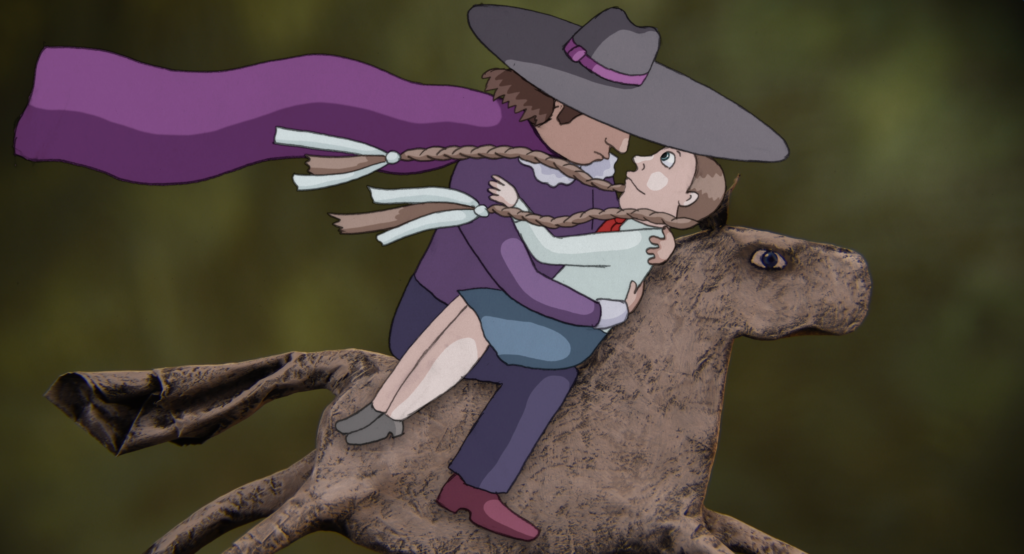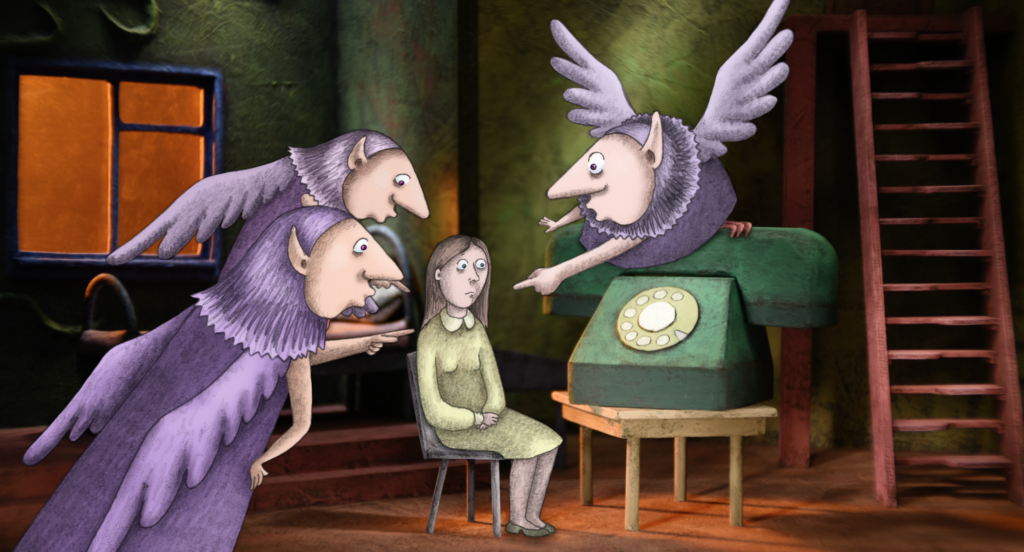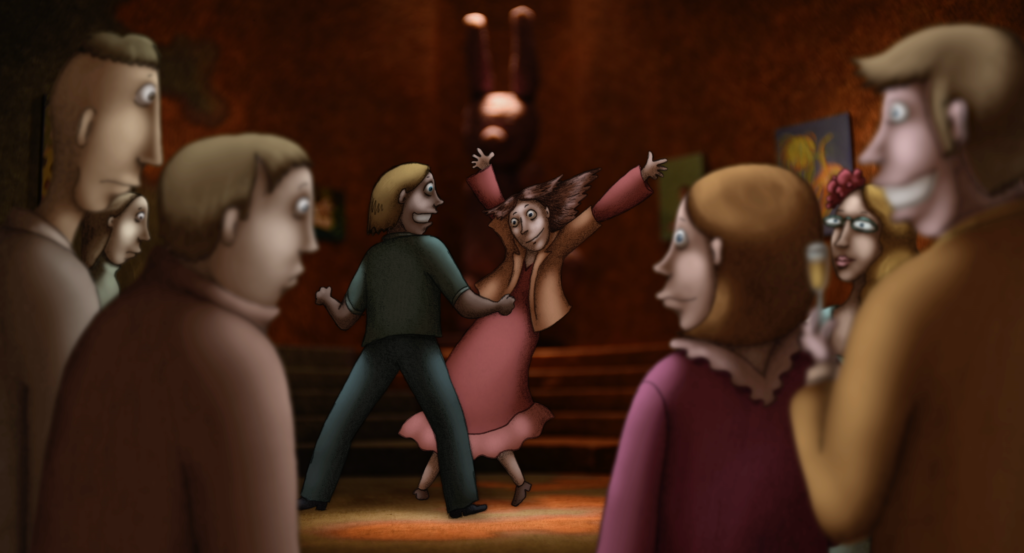Want to hear more from the actors and creators of your favorite shows and films? Subscribe to The Cinema Spot on YouTube for all of our upcoming interviews!
Managing editor & film and television critic with a Bachelor's of Arts in English Literature with a Writing Minor from the University of Guam. Currently in graduate school completing a Master's in English Literature.
The second film that I am reviewing for this year’s Tribeca film festival is My Love Affair with Marriage. Signe Baumane serves as the director, screenwriter, animator, and designer of the film’s narrative.
For those who have not seen the film, read ahead at your own behest. There may be spoilers ahead.

Plot Synopsis
According to the presskit for My Love Affair with Marriage, here is the synopsis for Signe Baumane’s Tribeca animated drama feature.
From an early age, songs and fairytales convinced Zelma that Love would solve all her problems as long as she abided by societal expectations of how a girl should act. But as she grew older something didn’t seem right with the concept of love: the more she tried to conform, the more her body resisted. A story about the acceptance of the inner female rebellion.
My Marriage Project
Discussion
At one hour and forty-eight minutes, Baumane’s Tribeca animated drama is a unique narrative that stresses the twists and turns of life. The film covers a variety of mature themes, beginning with conception. While this did initially throw me off, as the narrative progresses from its prelude of Inception, we are taken through the life of the protagonist, Zelma (Dagmara Dominczyk), a mere reflection of Baumane’s own experiences.
The film guides the viewer through different lessons of love and features some lovely musical numbers here and there too. Baumane breaks down the narrative into three parts: the Formation, the Implementation, and the Reconsideration. This act structure succeeds in facilitating the understanding of the narrative by vivisecting the different lessons gained in Zelma’s journey for love and, eventually, self-acceptance and completion.
I love how the film begins with the most fundamental aspect of human development: survival. This is an integral layer of Maslow’s hierarchy of needs, whose foundation consists of physiology and safety. From here, Baumane climbs towards the more psychological needs: love and belonging. Throughout Zelma’s love life, she learns about the norms of gender roles in the late-1970s, the 1980s, and the ’90s. For example, as a child, the character learns that girls do not fight boys and that girls must marry into the patriarchy.
Eventually, these become things that do not make her feel comfortable; and in fact, much of her interactions with men are what holds her back from self-realization. The fate of Darya (Carolyn Baeumler) is a strong indication of the consequences of not being careful enough and, in my opinion, a crucial turning point for the film.
The Crew of My Love Affair with Marriage
Baumane, Roberts Vinovskis (Studio Locomotive), Sturgis Warner, and Raoul Nadalet (Antevita Films) serve as the producers of this Tribeca feature. Matthew Modine, Adam Rackoff, and John Jencks serve as the executive producers.
Kristian Sensini composes the music. Yajun Shi animates the biology segments of the narrative.
Warner serves as the casting director. Baumane, Warner, and Yasemin Orhan serve as the set designers, while Baumane also serves as the director of photography for the project. She and Warner also serve as the editors. Pierre Vedovato serves as the sound designer.

The Cast of Tribeca 2022’s My Love Affair with Marriage
Dagmara Dominczyk voices Zelma, the protagonist of this Tribeca feature. Michele Pawk voices the film’s narrator, Biology. Ieva Katkovska, Kristine Pastare, and Iluta Alsberga (aka Trio Limonāde) sing as the Mythology Sirens.
Cameron Monaghan voices Sergei, Zelma’s first husband. Matthew Modine voices Bo, Zelma’s second husband. Stephen Lang appears as Jonas.
Eric Schroeder voices Elita, a peer during Zelma’s adolescence. Anna O’Donoghue and Tanya Franks voice Zelma’s teachers. Clyde Baldo appears as Eduards, a school bully, while Najla Said appears as the new girl at school.
Florencia Lozano voices Zelma’s mother, while Emily Kenney appears as Sarma, Zelma’s older sister. Dan Domingues appears as Lauris, while Keith Randolph Smith appears as a man on a train.
Carolyn Baeumler portrays Darya, while Christina Pumariega appears as the voice of Darya’s mother. Tracy Thorne voices the Master of Ceremonies at a funeral; while Laila Robins voices the Master of Ceremonies at Zelma and Sergei’s wedding.
Cindy Cheung plays Velta, while Ruby Modine plays Nina. Brian Dykstra and Andrew Garman play two Estonians. Michael Laurence plays a big man, while Sturgis Warner plays the big man’s friend. Dale Soules voices a Latvian official, while Jennifer Dorr White plays a Swedish pastor.
Performances and Character Developments
Dominczyk’s portrayal of Zelma is insightful and informs me into being more aware of the fears that women may face; especially in her time during the 1970s to 1990s, it is evident that many of the experiences that they endure are still present today. This is a very important character in the film and one that the viewer should be mindful of from the beginning to the end. She shows that the path to self-realization can be a long one, but it does require time and patience.
Monaghan’s portrayal of Sergei is just as powerful. At first, I did not recognize his voice and I believed the character came off as a good man. However, Sergei is inconsiderate of women. While he does have this notion that love exists for the sake of balance, the believes that women should serve men, the superior sex. By the end of the second act, Sergei becomes the very person who is far too common in our modern world. Deep inside, he is controlling, manipulative, and overall, abusive when it comes to his relationship with women; and Zelma’s final words to him in regards to love run deep: “Love is just a word for you, love is a destruction, an obsession, a manipulation. Love is a disease.”
I appreciate how Baumane depicts Modine’s Bo as “the Other”. This is a character who, as suggested, bends the gender roles. He does not quite understand what it means to be a woman, but he is learning. For Bo, to be the Other is not to be the Same; that is, he does not present himself as the other men throughout the film, and we are given this perception of him right when he is introduced. Baumane wastes no time in depicting these three primary characters, and there is something worthwhile when closely examining the way they each develop.

Final Thoughts on Signe Baumane’s Tribeca Feature, My Love Affair with Marriage
My Love Affair with Marriage is a beautiful narrative that takes the viewer through the stages of love and life. Baumane’s greatest feat deals with the libidinal decisions of her characters, who are ultimately just reflections of what comprises her past. This Tribeca film truly contains a memorable element that makes re-watching the film worth the trouble of seeing Zelma traversing this journey to self-realization all over again. She is very detailed in how she tells the story, and I believe many people will enjoy it as much as I have.
Signe Baumane’s My Love Affair with Marriage is now available to watch at the Tribeca film festival!
Are you at the Tribeca festival? Let us know! For more animation and drama-related news and reviews visit and follow The Cinema Spot on Facebook, Twitter, and Instagram!
Managing editor & film and television critic with a Bachelor's of Arts in English Literature with a Writing Minor from the University of Guam. Currently in graduate school completing a Master's in English Literature.





16 Comments on “‘My Love Affair With Marriage’ (Tribeca 2022) Non-Spoiler Review – The Matriarchy Through Maslow’s Hierarchy”